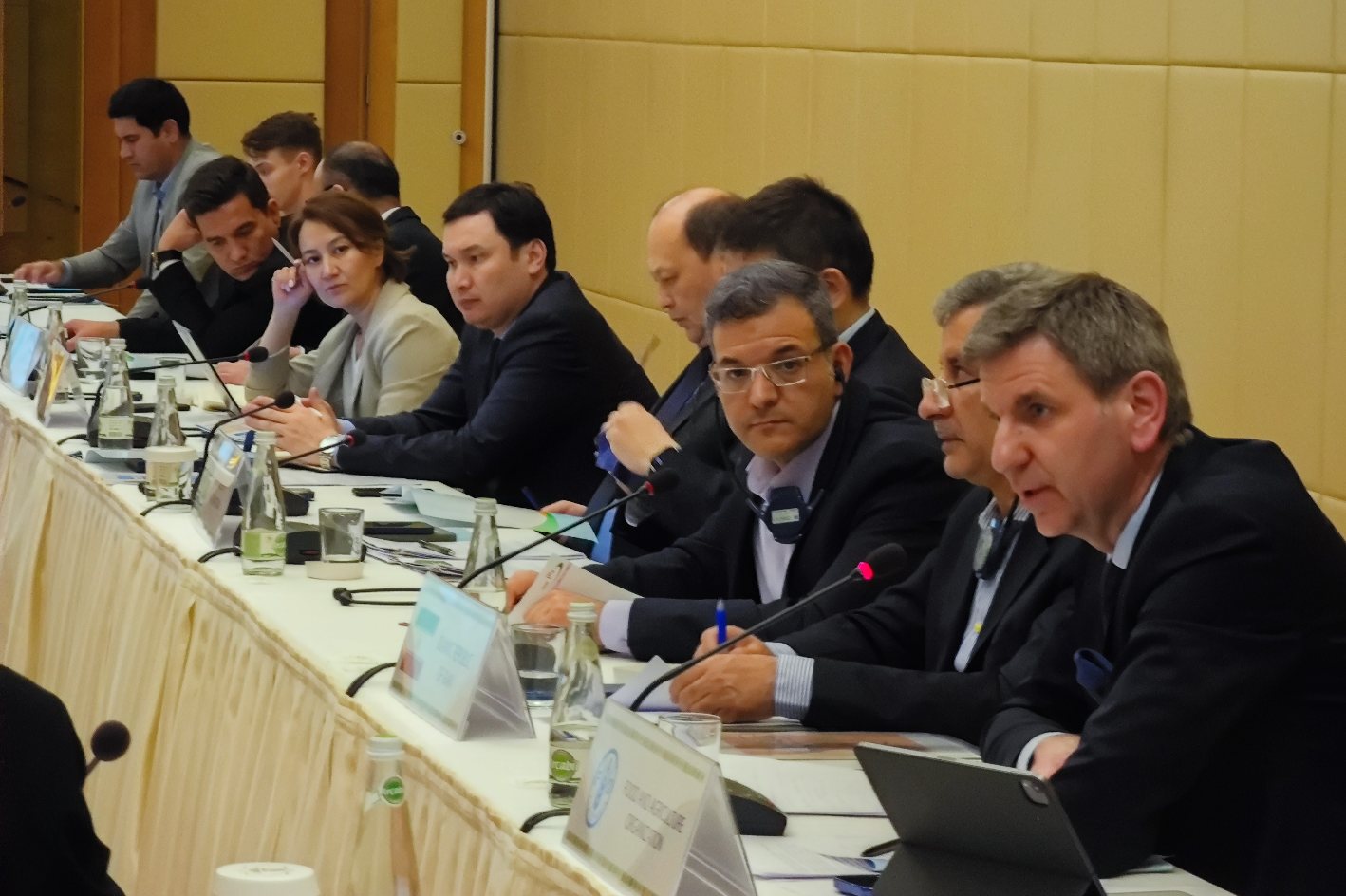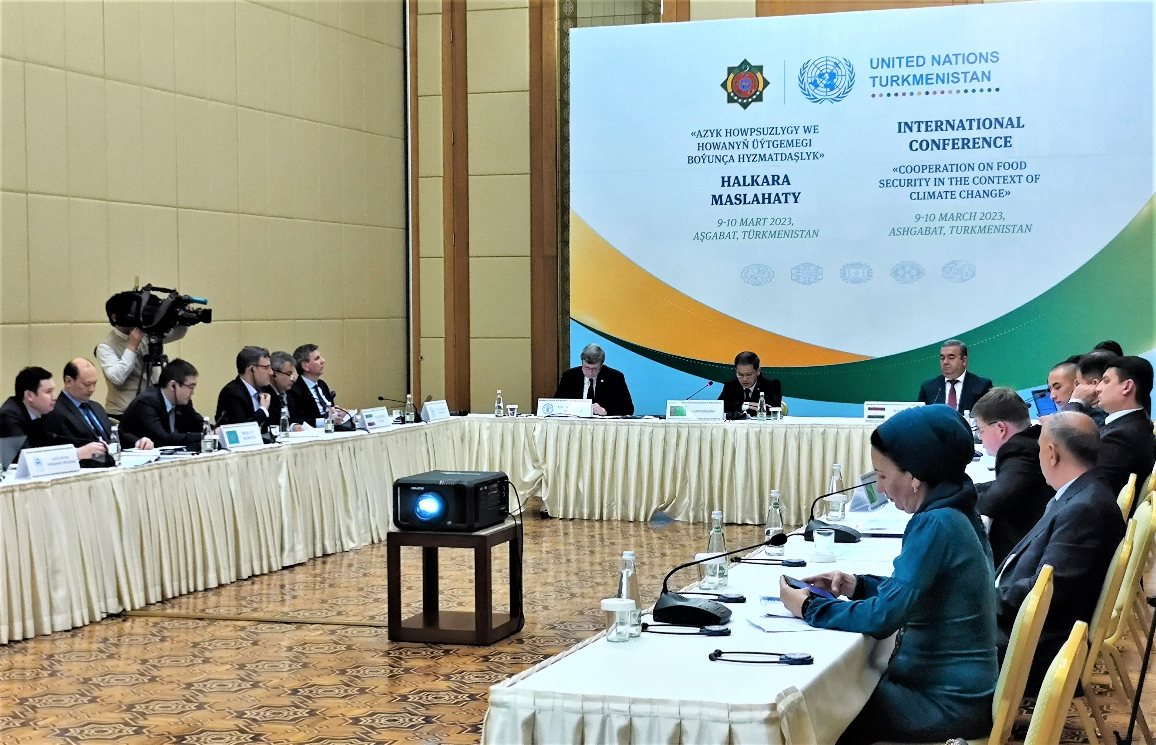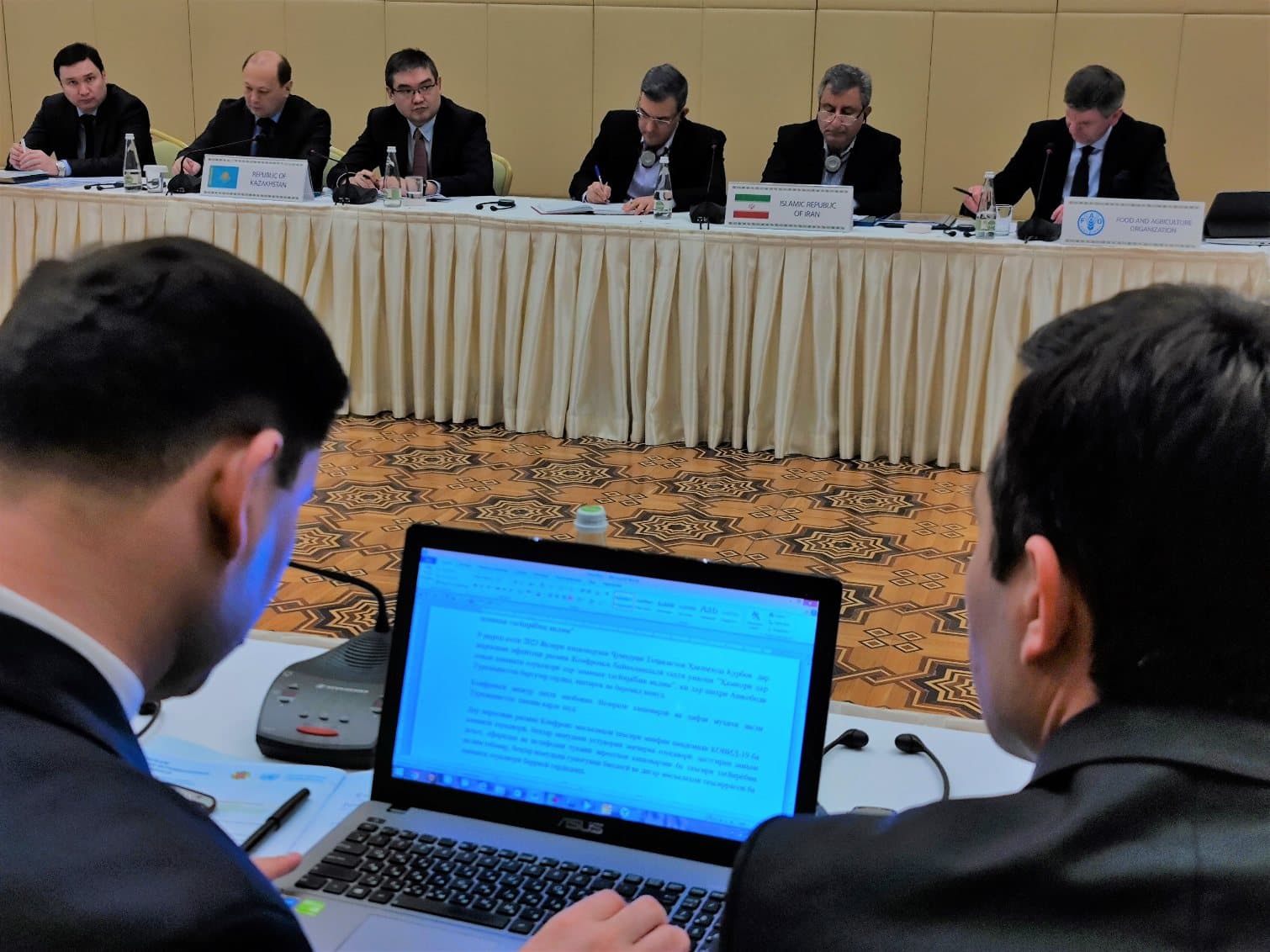The 7th meeting of agriculture ministers of Central Asian countries on the topic "Cooperation in the field of food security in the context of climate change" was held in Ashgabat on Thursday, March 9.
The topic of this meeting is of vital importance not only for the countries of Central Asia, but also for the countries of neighboring regions, such as Turkey, Iran and Azerbaijan, which face similar problems in this area.
The population of Central Asia is growing by almost 2.5% per year. This means that food production should grow at about the same rate. However, the observed climate change is already affecting food security due to rising temperatures, changes in precipitation patterns and an increase in the frequency of some extreme events.
In these circumstances, the urgent need to pave new paths paved with environmentally safe and sustainable solutions on a larger scale has significantly increased.

The search for solutions to the environmental and food crises requires technical knowledge about appropriate methods of ensuring resilience to climate change and the effective use of available data, including climate and natural resources, as well as information about agro-food systems in different regions.
"Strengthening regional and international cooperation is crucial for facilitating the exchange of knowledge about production systems and adaptation options, conducting vulnerability assessments, sharing and enhancing the value of genetic material and methods, managing fish stocks and other transboundary resources, as well as for preventing and managing transboundary risks," the subregional Coordinator of the Food and Agriculture Organization said at the opening of the event. and the United Nations Agricultural Organization (FAO) Viorel Gutu.
FAO is the most authoritative source of statistics on agriculture, land use and water use and has unique opportunities for decision-making in this area.

According to the representative of FAO, a key component of the formation of the trajectory of sustainable development should be a significant strengthening of existing mechanisms of regional cooperation, which have proved insufficient to address global challenges.
Minister of Agriculture and Environmental Protection of Turkmenistan Allanur Altyyev supported Viorel Gutu in the need to combine efforts and take immediate measures to adapt traditional agro-industrial practices to climate change. He noted that many countries rely primarily on agriculture in their climate adaptation plans.
Altyyev stressed that the issues of sustainable development of agriculture and food security are among the priorities on the agenda of the Government of Turkmenistan. In order to solve them, industrial production capacities are being increased in the country with the use of innovative, environmentally friendly technologies, advanced agricultural machinery and processing equipment are being purchased, the principle of a waste-free cycle is being introduced. The territorial location of production facilities is optimized to reduce water costs for its provision. The management system of agricultural processes, land and water resources is being actively digitized. At the same time, Turkmenistan pays the utmost attention to environmental issues and supports all international actions to neutralize climate challenges at the local and regional levels.

The FAO Regional Representative for Europe and Central Asia, Vladimir Rakhmanin, noted that each of the countries of the Central Asian region is unique in its own way and they all have a huge layer of traditions of nature management. He also welcomed the participation of a representative of the Government of Iran in the meeting of the Ministers of Agriculture of Central Asia, expressing confidence that the inclusion of this country in the dialog will make an important contribution to the general discussion.
In the conditions of the post-crisis crisis, the aggravation of military and political conflicts in the world, which have negatively affected the food supply of countries, only solidarity, only joint efforts can find effective answers to global challenges, including climate change.
"Winter is getting colder, summer is getting hotter, there is less water. Agriculture of all countries of the region is facing this problem," Rakhmanin said, emphasizing the need to support farmers. He also focused on the issue of smart water resources management and recalled that an international conference on this topic will be held in New York at the end of March under the chairmanship of the Governments of the Netherlands and Tajikistan with the active participation of FAO. The current meetings in Ashgabat may push to some important aspects and add more content to the upcoming forum.

Ivetta Zenina, a specialist in natural resources of the FAO sub-regional office, also joined the discussions remotely, who noted that according to the organization, the availability of food in the Central Asian region has improved qualitatively due to an increase in domestic production and imports. At the same time, the potential of this region can be much higher than today's indicators with more coordinated approaches.
All the states of the region are major water users, and most of the water is used for irrigation of agricultural land. While Tajikistan and Kyrgyzstan are not the countries with the greatest water scarcity, Uzbekistan and Turkmenistan live in a state of water stress, according to the expert. At the same time, she cited forecasts according to which, by 2030-2100, the volume of water will decrease by 30% in the Syr Darya basin and by 40% in the Amu Darya basin, which makes joint management of water resources in the region even more important.
Minister of Agriculture of Kazakhstan Yerbol Karashukeyev also joined the Ashgabat meeting online, in which the Kazakh delegation was physically represented. He drew the attention of colleagues to the fact that in the period 2020-2022, climate phenomena caused significant damage to world food supplies. Extreme drought has affected the yield of major food crops. And the rise in the cost of energy resources has led to an increase in the costs of collecting, transporting and processing food products.
In a complex way, these factors have increased pressure on markets and unbalanced food production and distribution systems. According to FAO experts, the share of expenditures of the population of Central Asian countries, including Kazakhstan, on food is 40-60%, which makes people extremely sensitive to price increases.

Karashukeyev told about the measures taken in Kazakhstan to reduce the mentioned consequences and put agriculture on an upward trajectory of development. In 2022, the country has harvested a record harvest over the past 10 years, 22 million tons of grain and leguminous crops (in weight after refinement), including wheat 16.4 million tons.
At the same time, Kazakhstan sets the task of increasing the production of agricultural products and food products, taking into account the increasing demand from neighboring countries. Also, one of the important issues is the efficient use of water resources in agriculture. "The shortage of water in our countries is taking on threatening proportions. In this regard, the tasks of irrigation and land reclamation, the introduction of modern irrigation technologies, moisture-saving technologies should be in the focus of attention of our countries," said Yerbol Karashukeyev, stressing that it is necessary to make greater use of the existing potential of our countries and intensify work to increase trade, improve its structure, expand the range of goods supplied.
Minister of Agriculture of the Republic of Uzbekistan Aziz Voitov also agreed that the problem of ensuring food security in the modern world is coming to the fore. Without the adaptation of agriculture to climate change, it is difficult to solve other acute economic and social problems.
According to recent studies, in order to preserve food security for the growing population of the planet, it is necessary to increase food production by 60% by 2050 compared to the current volume. "At the same time, we should all be careful and realize that outdated, extensive approaches in agriculture will lead us to a decrease in the quantity and deterioration of the quality of natural resources available for use in agricultural production," Voitov said.

He noted that Uzbekistan managed to achieve certain results in this direction thanks to reforms that shifted the focus from cotton monoculture to a more diversified production of fruits and vegetables, as well as through investment in infrastructure and education. Currently, a National system of knowledge and innovation in agriculture is being created in Uzbekistan. It will improve the knowledge and skills of agricultural producers of all categories within the framework of modern agroecological principles and international standards.
"The agrotechnical practices and knowledge of most of our farmers are outdated and unproductive and therefore also require mass training. Our task is to create all the necessary infrastructure, institutional, financial and information conditions to support farmers," Aziz Voitov urged.
At the same time, he noted that the countries of Central Asia have a huge agricultural potential. The diversity of nature and climate allows us to grow all the most important agricultural crops, while the production volumes are sufficient to feed people far beyond our borders. The Minister announced a number of proposals, including the connection of national agricultural monitoring systems for medium-term planning of production volumes, policy measures and development programs, as well as the opening of a training camp on digitalization of agriculture in Tashkent to train specialists from all Central Asian countries. In addition, it is proposed to create an electronic food Trade balance. Such a platform will allow the Central Asian countries to react quickly and distribute free volumes among themselves in times of peak demand.
During the Ashgabat meeting, the Ministers of agriculture confirmed their readiness to put into practice the concept of cooperation in the field of food security and adaptation to climate change, calling for the launch of joint initiatives and programs in this area.

On the sidelines of the meeting, Minister of Agriculture and Environmental Protection of Turkmenistan Allanur Altiyev and FAO sub–regional coordinator Viorel Gutu signed two joint documents - on the project "Support for the creation of digital land cadarship" within the framework of the FAO Technical Cooperation Program and a Work plan for 2023 on the regional project "Integrated management of natural resources in drought-prone and saline agricultural industrial landscapes in Central Asia and Turkey".
ORIENT
